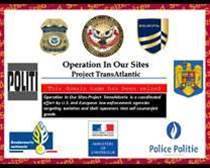Joint operations ahead of this week's Cyber Monday between American and European law enforcement agencies saw 132 domain names used by counterfeit merchandise sellers seized together with PayPal accounts used to receive sales proceeds.

Under the operation, agents made undercover purchases of sports jerseys, DVD sets, clothing, jewellery and luxury goods from sites suspected of selling counterfeit items and checked with copyright holders if they were authentic.
If not, seizure orders for the domains in question were obtained from federal magistrate judges.
PayPal accounts used for processing sales for the sites with proceeds over $170,000 were also targeted for seizures.

United States intellectual property law enforcement agencies say they have seized 1630 domains since 2010 and according to US Immigrations and Customs Enforcement (ICE), its "seizure banner" has had more than 110 million individual views throughout that time.
The domain seizure campaign has targeted innocent sites however, and come under fire from civil rights organisations such as the Electronic Frontier Foundation as violations of the right to free speech.
Democratic senator Ron Wyden criticised the US ICE department last year for its domain seizures, calling them "alarmingly unprecedented".
According to Wyden, "the domain name seizure process does not appear to give the targeted websites an opportunity to defend themselves before sanctions are imposed" unlike what happens in ordinary copyright litigation.



_(33).jpg&h=140&w=231&c=1&s=0)
_(20).jpg&h=140&w=231&c=1&s=0)
_(28).jpg&h=140&w=231&c=1&s=0)





 iTnews Benchmark Awards 2026
iTnews Benchmark Awards 2026
 iTnews Executive Retreat - Security Leaders Edition
iTnews Executive Retreat - Security Leaders Edition
 iTnews Cloud Covered Breakfast Summit
iTnews Cloud Covered Breakfast Summit
 The 2026 iAwards
The 2026 iAwards












_(1).jpg&h=140&w=231&c=1&s=0)



